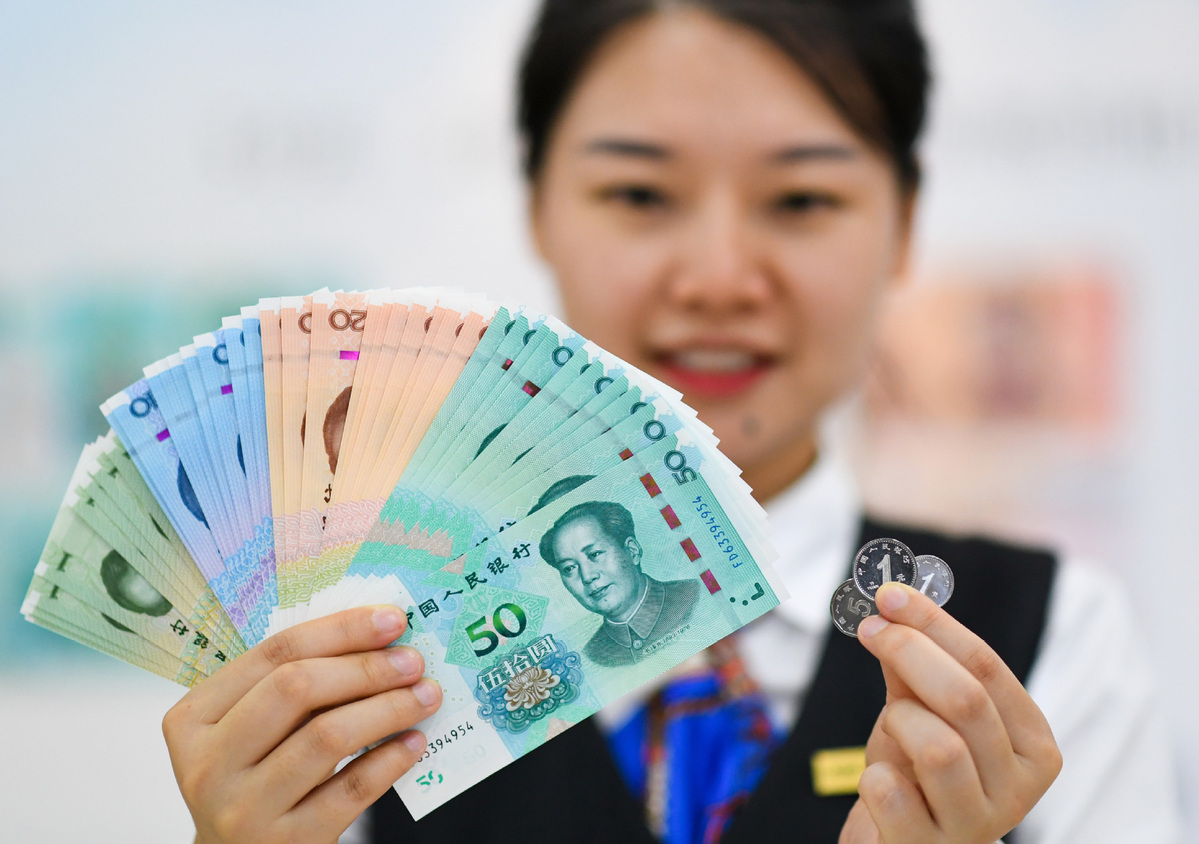China eyes steady growth amid Fed rate cut

A woman shows banknotes and coins included in the 2019 edition of the fifth series of the renminbi. (Photo/Xinhua)
Renminbi-denominated financial assets are likely to see more foreign capital inflows in the months ahead as the United States enters an interest rate cut cycle, giving Chinese policymakers more room to maneuver toward steady economic growth, analysts said.
The renminbi and Chinese equities rallied on Thursday after the US Federal Reserve's first rate cut in over four years.
The renminbi, or the Chinese yuan, strengthened by 293 basis points in the onshore market to 7.06 against the US dollar on Thursday, the strongest level since June 2023.
The Shanghai Composite Index, a benchmark of Chinese A shares, went up 0.69 percent to close at 2,736.02 points on Thursday, amid a wider rebound of emerging market stocks, with the MSCI index for emerging market stocks rising 1.09 percent as of Thursday evening.
Analysts said a major driver of the rebounds was that the US Fed's rate cut on Wednesday has signaled that the US has entered its first post-COVID monetary easing cycle, which will make financial assets of emerging market economies more attractive than before and give those economies more scope for policy easing.
On Wednesday, the US Fed slashed interest rates by 50 basis points and sent its target interest rate range to 4.75 to 5 percent amid easing inflation and a weakening labor market, more aggressive than a usual cut of 25 basis points.
With the Fed's focus shifting more to stabilizing the labor market, the US central bank is on track for further cuts of about 50 basis points by the end of the year and approximately 100 basis points in 2025, according to the Fed's projections on Wednesday.
"The Fed's rate cut cycle may trigger a global wave of interest rate cuts by central banks, leading to a decline in the US dollar index, an appreciation of the renminbi, and global capital flowing back to emerging markets," said Yang Delong, chief economist at First Seafront Fund.
"Expectations of renminbi recovery may attract foreign capital inflows into renminbi-denominated assets, driving up their valuation level," Yang said, adding that the Fed rate cut will benefit the A-share market, particularly if China launches more monetary easing moves that will bolster economic recovery and brighten investor sentiment.
Jin Xiandong, director of the National Development and Reform Commission's Office of Policy Studies, said on Thursday that the country will intensify macroeconomic adjustments and introduce incremental policy measures when necessary.
Li Chao, chief economist at Zheshang Securities, said that China's monetary policy has more room to maneuver as pressures for stabilizing the renminbi exchange rate are easing, and a cut in the reserve requirement ratio — the proportion of deposits that banks must keep as reserves — may be on the horizon to maintain ample liquidity and reduce financing costs.
Freddy Wong, head of Asia-Pacific at Invesco Fixed Income, a global investment management company, said China's government bond market may also see global capital flowing in as the renminbi may strengthen against the greenback by 3 to 5 percent, making Chinese bonds more attractive to dollar-denominated investors.
As of August, overseas institutions' holdings in China's interbank bond market had risen for 12 consecutive months, an increase in foreign holdings of as much as 1.34 trillion yuan ($189.7 billion), according to the Shanghai head office of the People's Bank of China, the country's central bank.
Photos
Related Stories
Copyright © 2024 People's Daily Online. All Rights Reserved.









